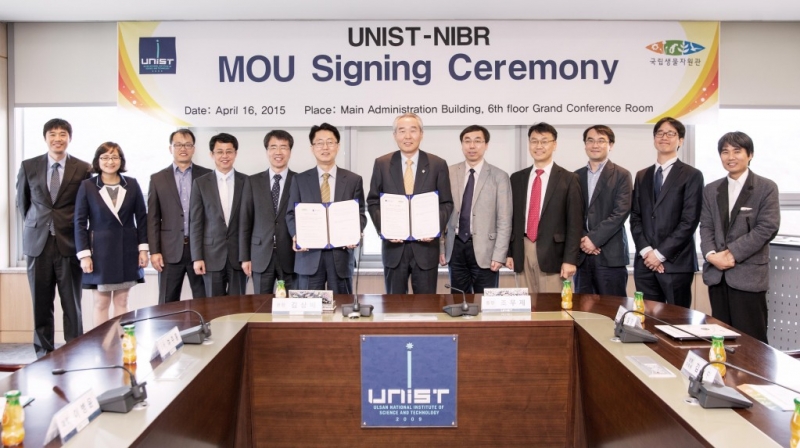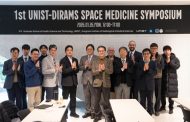On April 16, UNIST signed a Memorandum of Understanding (MOU) with National Institute of Biological Resources (NIBR), an institute that boasts the largest collection preservation facilities in Asia to pledge mutual support for one another in the pursuit of excellence in genome research and its application to human health.
The ceremony was attended by NIBR President Sang-bae Kim, UNIST President Moo Je Cho, Yoon-Kyoung Cho (Chair of School of Life Sciences, UNIST), Prof. Jong Hwa Park (The Genomics Institute (TGI) and School of Life Sciences, UNIST), and other professors of related departments. Director Byoung-Yoon Lee, Manager Joo-Hong Yeo, Researcher ChangMoo Kim, Researcher Woo Young Bang, Researcher Soon-ok Kim also took part in the ceremony from NIBR Biological and Genetic Resource Assessment Division.

The signing ceremony of MOU between UNIST and NIBR took place at UNIST Main Administration Building on April 16, 2015. The MOU was signed by UNIST President Moo Je Cho and NIBR President Sang-bae Kim to enhance the scientific and technical cooperation between the two institutions.
The MOU was signed by President Cho, UNIST and President Kim, NIBR to enhance the scientific and technical cooperation between the two institutions. The partnership between UNIST and NIBR will take both their advantages so as to better improve the biodiversity preservation and to advance genome research. The MOU provides a framework for research activities addressing ocean-related issues, as well as the exchange of scientific information, the exchange visits of scientists and other experts.
“Preserving biological diversity, especially marine biodiversity is essential for life on earth and it is the front line of the 21st century. Through this partnership, we hope to strengthen the country’s global competitiveness by further studying the Earth’s biological resources.” says UNIST President Cho.
Prior to the signing of MoU, both parties discussed and agreed to jointly fund collaborative research and innovation projects in the areas of the environmental and industrial biotechnology to strengthen overall research and innovation relationship between NIBR and UNIST.
NIBR President Kim said, “We hope to develop a stronger cooperative relationship with UNIST. Through this agreement, together with the Genomics Institute (TGI) of UNIST, we hope to preserve biodiversity and to incubate specialized human resources in the needed fields.”
The Genomics Institute (TGI) is a core research facility of the School of Biomedical Engineering at UNIST. TGI’s primary mission is to improve the human condition by conducting high-quality genome-based research and by implementing new approaches to the study of biology with the goal of understanding human health and disease, as well as evolution and the biology of other organisms. TGI is a world leader in genomic science that boasts many prominent scientists and has been actively conducted genetics research on minke whales, tigers, and lions with the goal of providing the vary core of new genomic technologies.















